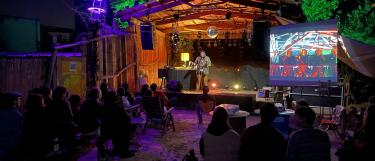
NEW NOW Festival for Digital Arts
The field of tension between the end and the start of historical epochs is the topic of an interactive video production of the Käte Hamburger Centre for Apocalyptic and Post-Apocalyptic Studies (CAPAS) at Heidelberg University, which arose in the context of the NEW NOW Festival for Digital Arts in 2021 on the grounds of the UNESCO world heritage site Zeche Zollverein.
In dialogue with international artists, members of CAPAS open up new perspectives on times of societal upheaval and related apocalyptic visions. Against the background of the coal and industrial age, they discuss the question of how apocalyptic scenarios impact on societies and individuals, and on the relationship between humankind and nature. They shed light on the ambivalent role of coal production, which, on the one hand, symbolises technological progress, but, at the same time, stands for a global dependence on fossil raw materials.
A further part of the festival was the conference “Another End is Possible”, which was about the interface between science and the arts with up-to-date questions about visions of doom and the possible managing of upheavals. In this context, Prof. Dr Robert Folger, a Romance Studies scholar at Heidelberg University and Director of CAPAS, along with other researchers from the Käte Hamburger Centre, explained, on the example of the continent of Latin America, how the European colonial idea was influenced by apocalyptic thinking and can be interpreted as an expression of the creation of the New World. Mexican artist, author, and poet Rojo Córdova also took part in the conference as a guest of CAPAS. Following the Festival, he put on an interactive live performance in Heidelberg and, amongst other things, presented his post-apocalyptic virtual reality installation entitled “Terrorchitlán” and his new book “15 años, 15 textos rojos”.

In the context of the NEW NOW Festival for Digital Arts, which took place for the first time in summer 2021, international artists move their temporary studios into the industrial monuments on the grounds of the former coal mine in Essen and develop new works and projects, ranging from printed three-dimensional sculptures and video productions to works from the field of virtual reality.